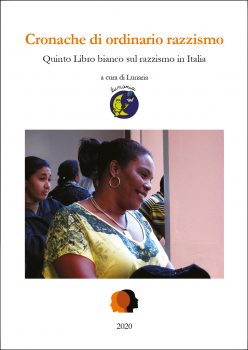
The assault of Beatrice Ion, a basketball athlete suffering from polio, on 9 July in Ardea, and that against a Bengali street vendor whose name we do not know, pushed by two young men in the Naviglio in Milan two days ago, are not isolated cases.
7,426 are the cases of discrimination and racism documented by Lunaria between 1 January 2008 and 31 March 2020. Among them, 901 are the stories of people who have been offended, insulted, threatened, punched or even killed for belonging to a stigmatized, despised, dehumanized minority. Among them there are Abdul Salam Guibre, killed in Milan on September 14, 2008, officially for stealing cookies; Kwame Antwi Julius Francis (31 years old), Affun Yeboa Eric (25 years old), Christopher Adams (28 years old), El Hadji Ababa, Samuel Kwako (26 years old), Jeemes Alex, 28 years old and Joseph Ayimbora, victims of the racist mafia massacre in Castel Volturno on September 18, 2008. Emmanuel Bonsu, badly beaten “by mistake” in Parma on September 28, 2008, by a group of traffic officers; Alina Bonar Diaciuk, left to die in a police station at Villa Opicina on April 16, 2012; Muhammad Shahzad Khan, beaten to death in Rome on September 18, 2014 because he disturbed the quiet of the neighbourhood with his prayers; Emmanuel Chidi Namdi, killed in the street in Fermo on July 5, 2016, because he dared to react to an insult addressed to his companion; Wilson Kofi, 20 years old, Omar Fadera, 23 years old, Gideon Azeke, 25 years old, Jennifer Otiotio, 25 years old, Mahmadou Touré, 28 years old, Festus Omagbon, 32 years old, all wounded during the racist raid carried out by the “avenger” Luca Traini in Macerata on February 3, 2018; Soumaila Sacko, shot dead in San Calogero on 8 June 2018.
With this white paper Lunaria aims to give back humanity and memory to all women and men who suffer racism on their own skin, and who are often reduced to a name and a surname mentioned in a short local news report, without recognizing the discriminatory nature of the violations they suffered. It’s essential to break down the wall of denial, omission and removal, which for too long has inhibited the Italian public debate on discrimination and xenophobic and racist violence, treated punctually and systematically as acts of madness, individual and isolated, because xenophobia and racism are social, structural, ordinary and systemic phenomena, in which collective actors play a central role: institutions, parties and media operators, in particular. And it is important to reconstruct the indissoluble interrelation of migration, migration policies and racism, which has characterised the recent history of our country since the 1980s.
The Fifth White Paper on Racism in Italy proposes a reading with five introductory analysis contributions, an examination of the available data and twenty-two exemplary stories, chosen because they have had a significant judicial process or because they show the different forms that the interaction between discriminatory discourses, policies and social behaviour can take. The analysis is made possible thanks to the daily work of monitoring, reporting, information and awareness-raising carried out with the website www.cronachediordinariorazzismo.org.
The 2020 edition of the White Paper is the result of a collective work. They contributed to its realisation: Paola Andrisani, Paola Barretta, Sergio Bontempelli, Giuseppe Faso, Francesca Giuliani, Veronica Iesuè, Martino Mazzonis, Grazia Naletto, Leone Palmeri, Elisa Pini, Annamaria Rivera, Roberta Salzano.
The English edition is available online here
Download PDF file: Chronicles of Ordinary Racism. Fifth White Paper on Racism in Italy
The Italian edition of the White Paper is available online here
More info: Lunaria, comunicazione@lunaria.org Tel. 06.8841880










